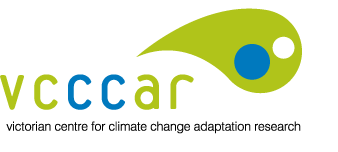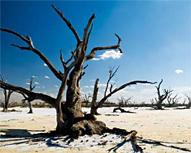The end of the beginning

30 June 2014 marks the formal end of the five-year funding agreement between the University of Melbourne and the Victorian Government that underpinned the agreement between the VCCCAR university partners: Deakin, La Trobe, Monash, Melbourne and RMIT universities to collaborate in climate adaptation research.
It has been quite a journey over the last four and half years as we built up our activities, some key achievements include:
- Fourteen research projects involving over 50 university researchers from multiple disciplines working together with partners from the Bureau of Meteorology and CSIRO, eight different Victorian Government agencies, local government and industry, resulting in the production of over 60 high quality reports, policy briefs and other outputs.
- Twenty think tanks on topics ranging from infrastructure and financial services to water resource management, development at the urban fringe, regional cities, human health to climate services held in Horsham, Hamilton, Bendigo, Warragul, Bundoora, Frankston, Warrnambool and Kerang.
- Five annual forums involving over 500 participants in Bendigo, Geelong and the metropolitan region, providing a venue for knowledge exchange, learning and capacity building in managing climate risks across state and local government agencies and the broader community.
- Involvement of international leaders in climate science and adaptation in Victorian climate change issues, such as Professor Rob Wilby on flood risk management, Dr Kate Lonsdale on building learning organisations, Professor Jonathan Overpeck on large-scale drought risk management and Dr Ben Preston on creating new institutions for adaptation. Keynote speakers at the Annual Forums such as Professor Mike Hulme (now with Kings College, London) and Lord Krebs of Oxford University have been impressed with our activities.
Through these activities we have developed new modes of research and new approaches to supporting conversations between and with local governments through the Climate Connections series. We have fostered lasting relationships between university researchers and officers in state and local governments.
I am particularly pleased with the many disciplines we have had involved in the Centre’s activities (climate scientists, geographers, economists, social researchers, designers, planners, lawyers, environmental managers, ecologists and policy experts) and the genuine efforts they have made to work across these disciplinary divides.
I am very proud of the level of engagement we achieved with local government, partners such as the City of Melbourne, City of Port Philip, Cities of Greater Bendigo and Geelong, regional organisations such as the Association of Bayside Municipalities, and smaller communities such as Sea Lake. We have worked closely with essential service providers such as Melbourne Water, City West and Yarra Valley Water. I should also mention the excellent collaborative partnerships with community organisations such as the Southern Grampians Primary Health Care Partnership, Grampians Pyrenees PCP, Dame Pattie Menzies Centre, Women’s Health in the North (WHIN) and enliven.
Our collaboration with the Yorta Yorta community, led by Professor Dave Griggs at Monash University, provided a new basis for including and empowering indigenous people and building on the foundation of their knowledge to better manage the natural resources of the Murray River region in the face of a changing climate.
Our work with consultancy firms such as AECOM, Netbalance and ARUP has added a new dimension to some of our research projects and other activities.
I would also like to thank the former Minister for Environment and Climate Change, the Hon. Gavin Jennings MP, the current Minister for Environment and Climate Change, the Hon. Ryan Smith MP and, in particular, Parliamentary Secretary for the Environment, the Hon. Brad Battin MP and his predecessor the Hon. Donna Petrovich MP, for their ongoing support and engagement and regular participation in our Annual Forums.
My frustrations have been few but include not being able to achieve a higher integration of planning and investment with our national partners, CSIRO and NCCARF. This is a sign that our institutional arrangements in Australia need further development in order to maximise the synergies from investment from different levels of government. I have also been frustrated in not being able to maintain the interest of higher levels of government bureaucracies in conversations about the management of climate risks.
I would like to thank all those who have been involved in our activities:
- Professors Jon Barnett and Ruth Fincher were instrumental in early discussions regarding the establishment of the Centre and Kate Auty, Peter Christoff, Chris Mitchell, Mark Wootton and other members of the Ministerial Advisory Committee for Climate Change Adaptation for their continuing advice, involvement and support for our activities.
- Tanya Bezzobs from the University of Melbourne Research Office and her counterparts in the other universities for their contribution to the development of the Centre Agreements.
- Members of Implementation Committee: Professors Andy Bennett (Deakin), initially Annabelle Duncan and then John Martin (Latrobe), Nigel Tapper (Monash) and especially Darryn McEvoy (RMIT), who was the Deputy Director and supported me in many different ways during the development of the Centre.
- The Advisory Board members: Professor John Zillman (Chair), Dr Andrew Ash (CSIRO), Professors Lee Astheimer (Deakin), Lin Crase (Latrobe), Dave Griggs (Monash), Paul James (RMIT), Jean Palutikof (NCCARF) and Rick Roush (Melbourne) and many others from these organisations who deputised on a number of occasions.
I would like to acknowledge the many different contributions from officers of the Victorian Government but particularly thank Mr John Houlihan of DEPI who was involved in the development of the Centre from an early stage. John’s ongoing commitment, sound advice and support within government has been a major contributor to our success.
Finally, I would like to acknowledge the contributions of the staff involved in managing Centre activities. They were a small but committed and productive group. Craig Prebble and Emma Joughin provided valuable support early in the life of the Centre. My heartfelt thanks to Celeste Young, Phoebe Bond and Linda Poke for their efforts in organisation, communication and administration. Most of all, I would like to thank Doug Scobie for his efficiency, commitment, good humour and companionship. Most of what we have achieved in the Centre is down to our strong working relationship and I wish him well in the next stage of his career. I’ll miss him.
This is the end of the first stage of the journey in adapting to climate change in Victoria. I know that through your efforts we have provided a sound platform of knowledge and relationships for the next stage.
Best wishes


